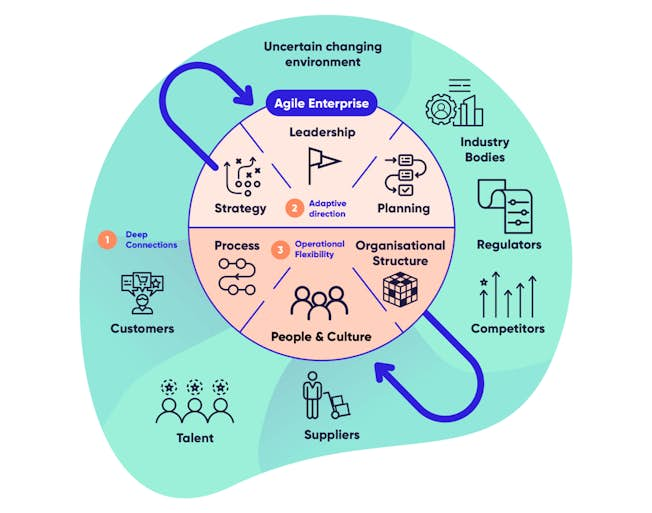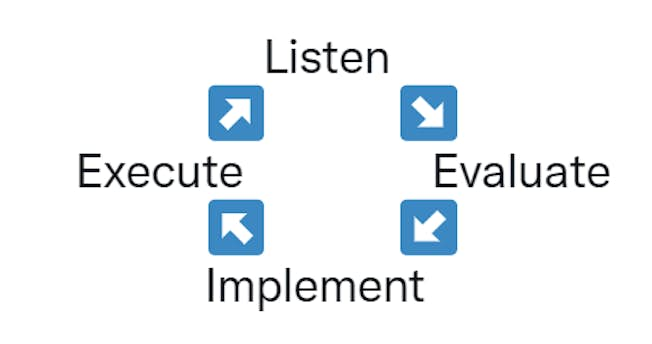Oct 12, 2022
Why Marketing Should Lead Your Digital Transformation in 2023 & How To Do It
All marketers want to create a better customer experience. It’s what can make or break an organization, as the experience a prospect or consumer has is key to not only driving conversions and revenue but customer loyalty and advocacy.
71% of senior marketers and 61% of mid-level marketers are responsible for digital transformation in their organizations according to research in ‘The Marketing Evolution: Leadership, Transformation, Skills, Challenges & the Future’.
Despite this, ‘The 2021 State of Digital Transformation’ found that only 23% of CMOs co-own digital transformation, with IT more often taking the lead.
But this shouldn’t be the case as marketing leaders and their teams are best placed to take an active role in transformation. In this blog, we’ll explore the skills and knowledge that enable marketing to accelerate and execute your digital transformation strategy.
Why are marketing leaders best placed to lead?
The role of a marketing team is to inform, influence, and convert. That requires unique skills and a set of insights into the working of a business and the customer.
When it comes to creating a digital transformation strategy, marketing leaders can pull back and see the bigger picture; create a vision of where the company is and where it needs to be.
This is not only for marketing but across the business and its functions as the entire customer lifecycle needs to be front of mind in digital transformation, not just parts of that lifecycle
Know thy customer
A key part of a marketer’s job is to keep on top of new trends and developments. This not only includes technology but also customer needs and behaviors. This is vital for any business in scenario planning and future-proofing.
There is also no getting away from the importance of customer experience. Customers are getting more demanding and seek out an omnichannel approach where every touchpoint in a business is consistent and seamless.
So, if a customer clicks on a social media post to find out more about a new product, make sure that the next point of contact relates to that product (e.g custom landing page) and is on brand, otherwise, you will lose their attention instantly.
Understand your data
Marketing leaders rely on data. This helps them to make better decisions whether that’s the performance of a paid ad or close rates from lead to sale.
You can have vast amounts of data but there’s a skill to getting insights that will matter to your business. You want data that drives performance, leads, and revenue and marketing teams can help your business to do that.
Devising a digital transformation strategy is not only about understanding your business data, it’s about knowing the wider ecosystem. Do you know what your competitors are doing? Can you provide a snapshot of your industry and what’s coming up as a key development in the next 12 months?
Market research and forecasting are part of a CMO’s job. It’s gauging the external environment and understanding how a business fits into that. This helps to make improvements where it matters and brings focus to areas that may be underdeveloped or under-resourced in a business.
Soft skills
Technical knowledge and skills are essential in today’s workplace, particularly in marketing. However, that’s not the full picture.
Soft skills, also known as power skills, which encompass behaviors, personality traits, and work habits are just as important. Plus, they help to create teams that are diverse and agile - a must for any digital transformation process.
‘The Future of Work: 2022 Global Report’ found that the top skills in demand with employers cited soft skills such as dependability, flexibility, problem-solving, and teamwork/collaboration. Other soft skills include creativity, innovation, curiosity, and persuasion.

It’s these types of skills that foster collaboration and help people to have durable careers, which in turn means long-term success for a company.
Tip: Read ‘9 Essential Soft Skills for Digital Marketers’ if you’re looking to get the right knowledge in place for your team.
What marketers need to own: An agile strategy
Agility is crucial in digital transformation. It helps companies to respond to changes in both an internal and external capacity. This ability to pivot quickly will help maintain or improve customer engagement and drive harmony in a workforce by creating productive and engaged employees.
This is why marketing leaders and their teams need to adopt an agile strategy. But, what does that mean?
Enterprise agility is more than just product or software delivery, it’s about the structure, operation and behavior of your business. It’s about establishing deep connections, an adoptive direction and operational flexibility (see this example below from Riverflex).

This not only should focus on being customer-centric but also on the talent you have in-house. It’s about optimizing skills and knowledge through continuous learning and easy upskilling with agile thinking built in.
Ultimately, it’s a holistic and integrated view of your entire business environment with everyone working towards a common goal and being prepared to adapt when necessary.
Tip: Download ‘Perpetual Evolution: The interplay of talent and technology in the future of marketing’ for opinions from industry leaders.
How do you make transformation happen?
It can be difficult to lead and embrace change. But there’s no choice in today’s fast-moving environment. The pandemic showed us how quickly the external environment can shift without warning and it’s how you react that will determine success.
Some of the most common problems for leadership in executing change according to Fortune 500 leadership consultant turned Non-Profit Director, Jacob Espinoza is:
- A lack of follow up
- Analysis paralysis
- Unclear expectations
- Making decisions in a bubble
- Changing too much at once
The solution to all of these issues? The leadership flywheel involves 5 simple steps.

- Listen - This focuses on listening to your customers and employees. Take an interest in customer feedback such as reviews or calls, and get customers involved in polls or focus groups. For your workforce, create a feedback environment and hold regular meetings to get insights.
- Evaluate - Focus on your business goals and refer to your KPIs. Then use the data you have to see where the biggest change could be made. Don’t wait for more data, let marketers use the intelligence they have to inform decisions.
- Implement - Inform and prepare your team for change. Every team member should know what’s coming, when, and what’s expected of them to achieve it. This could involve providing training if necessary and being available to discuss the ‘why’ to move it forward.
- Execute - This is about how you execute what’s decided on and follow up with your team. At this stage, coach and develop any gaps, communicate expectations, and recognize early adopters.
- Repeat - Be committed to the changes you are making and take your teams along with you. When you’ve made one change, go back and repeat these steps for subsequent changes. Change is hard but worth it in the end.
Tip: Read ‘The Future of Marketing After Covid-19’ for great insights into post-pandemic marketing.
Drive business success with your marketing team
The key to digital transformation success is to have a marketing team with cutting-edge knowledge and skills. Help your marketers reach their full potential by offering flexible and online certified training from the best in the business. Contact DMI today to empower your employees and progress your transformation journey.
Related
- Categories:
- Articles
- Digital Management and Leadership
Upgrade to Power Membership to continue
your access to thousands of articles, toolkits, podcasts, lessons and much much more.
Become a Power Member- Login
- View Courses
- - - -
- Courses
- Resources
- - - -
- My Account
- Change Password
- Logout




